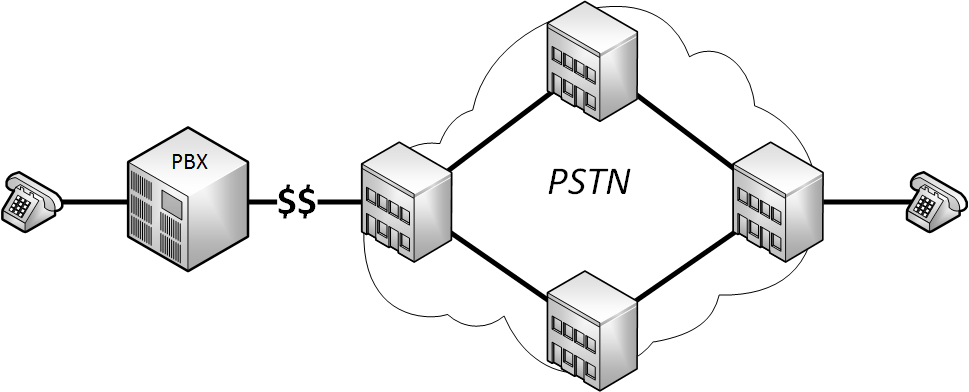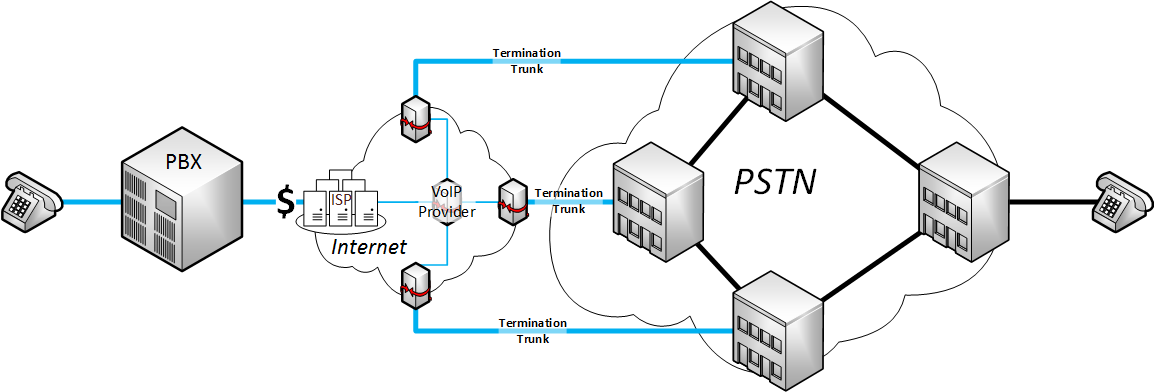IP Telephony – Network Requirements – Your Internet Connection (WAN)
THE INTERNET
A critical piece of the VoIP puzzle is your connection to the outside world.
Before VoIP, the phone company controlled how your telecom services got to your site. They owned what is commonly termed The Last Mile—all the infrastructure right to your door. If you wanted to connect to the Public Switched Telephone Network (PSTN), you had to go through them.

Traditional connection to PSTN
While you can still order traditional PSTN circuits, there’s hardly any point these days. The theoretical benefits of legacy circuits are seldom realized in practice. In fact, even old-school PSTN circuits are as often as not delivered across a VoIP connection.
These days, VoIP is almost always the way to go. You connect to a VoIP carrier across your internet connection, and they in turn have switching equipment that they tie into the PSTN at strategic points (this is normally called termination, since they are connecting your VoIP connection to the PSTN at the termination point). VoIP providers make their money because they can negotiate volume discounts, as well as carry toll traffic on their own network.

VoIP Topology in the WAN
Your VoIP carrier will provide some or all of your telephone connectivity to the PSTN. This could be in the form of a DID and termination provider who will provide connectivity to your existing PBX, or it could be a fully-hosted system that handles all of the call control for external and internal calls, with only VoIP telephones at your site. Regardless of the VoIP service you select, the quality of the internet connection between you and your VoIP provider will be critical.
Fortunately, since most ISPs these days also offer some sort of VoIP service, they generally do a good job of ensuring all voice traffic is carried properly on their network. In addition to this, carriers generally do a good job of interconnecting between each other as well. This is unfortunately not always the case, so be sure you use google to get a feel for how well your ISP handles VoIP quality issues. There’s lots of competition, so you hold the cards so long as you’re willing to do the research.
In some cases, you may require a premium network connection to your carrier. Generally this will be required when there is poor internet service in your area, or where your ISP does not have strong competition and they have allowed their network to degrade. In this case you will need to add the cost of an enhanced network connection to the cost of your VoIP service, and perhaps compare that to the cost of a more traditional telephone service such as PRI. (note that many PRI providers actually deliver the PRI across a VoIP connection, so make sure you get it in writing what they are commiting to deliver in terms of quality).
Your VoIP provider should be able to work with you, your network team and your ISP to ensure the internet connection at all your facilities is able to handle the job of carrying your VoIP traffic. In many cases a test or trial can be set up to validate the quality prior to committing all of your telephone infrastructure to the new solution.
If you are not sure whether your internet connection is up to the task, get in touch with us. We have tools that can help to evaluate the suitability of your connection.

Leave a Reply
Want to join the discussion?Feel free to contribute!